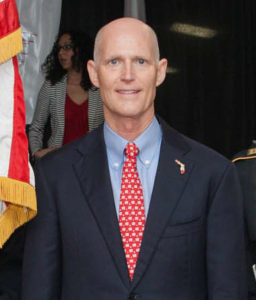
By JIM TURNER AND JIM SAUNDERS
THE NEWS SERVICE OF FLORIDA
Gov. Rick Scott says the state’s business-recruiting arm is running short of cash for incentives, and he wants to increase pressure on lawmakers to inject more money into enticing companies to Florida.
During what one attendee of an Enterprise Florida meeting Thursday described as a political rally, Scott said the state has just $9 million remaining for this year’s recruitment efforts. Bill Johnson, president and CEO of the public-private agency, added that money for performance-based deals could be gone in a matter of weeks.
“Clearly, it could be six weeks, it could be eight weeks,” Johnson said. “It is imminent, because $9 million doesn’t go far.”
More important, Scott said the money isn’t enough as the state seeks to attract companies such as General Electric to help ease Florida’s dependence on tourism, real estate and construction. GE has been critical of Connecticut’s new budget and in June told employees an “exploratory team” had been assembled to look at relocating the company’s headquarters “to another state with a more pro-business environment.”
“When was the last time you ever heard a Fortune 500 company publicly say they’re thinking about moving from a state,” said Scott, who went to Connecticut in June on a business-recruitment mission. “GE did that. We have a shot at getting companies like GE. But we can’t get companies like GE if we don’t have any money.”
Earlier this year, Scott asked lawmakers to set aside $85 million for business incentives. The final budget for the fiscal year that started July 1 included $53 million for Enterprise Florida, of which $43 million was for incentives and $10 million was for marketing.
Senate Transportation, Tourism and Economic Development Chairman Jack Latvala, R-Clearwater, argued in June against Scott’s request. He said the agency should use more private money for incentives and that marketing dollars should come from $86 million that Enterprise Florida already has in an escrow account.
Scott said Thursday the escrow money can only be used when companies lured to Florida — or lured to remain in Florida — reach pre-set job creation goals.
Johnson said he wants his agency to be as powerful as the tourism organization Visit Florida, which received $74 million for marketing. On Thursday, he played more of the role of a coach giving board members a pre-game pep talk.
He joined Scott in urging Enterprise Florida board members to lobby lawmakers before the next regular legislative session begins in January. Johnson said that if the state could immediately close on every deal now being worked on, it would be $45 million short.
“The number that Gov. Scott presented to the Legislature at the start of session last March was the right number,” Johnson said. “$43 Million — my friends — is not the right number. Not if you want to have money in the tool kit. Not if you want to compete with Texas, the Carolinas, Arkansas and other states.”
NOT ON THE RADAR
As Quinnipiac University released one of its periodic Florida polls Thursday, most of the media attention focused on the leading candidates in the 2016 presidential horse race. And rightly so.
But other candidates apparently are all but off the radar of Florida voters.
Quinnipiac used a list of 17 Republican candidates in measuring support from registered GOP voters. Five candidates — former Virginia Gov. Jim Gilmore, South Carolina Sen. Lindsey Graham, former New York Gov. George Pataki, former Texas Gov. Rick Perry and former Pennsylvania Sen. Rick Santorum — did not make it to 1 percent support. Meanwhile, New Jersey Gov. Chris Christie and Louisiana Gov. Bobby Jindal each received 1 percent.
On the Democratic side, former Rhode Island Gov. Lincoln Chafee did not make it to 1 percent, while former Maryland Gov. Martin O’Malley and former Virginia Sen. Jim Webb each got 1 percent.
TWEET OF THE WEEK: “The lost art of brevity is still lost in the Florida Senate today. Ugh.” — (Brian Hughes@GoMeteoric) on Wednesday.



